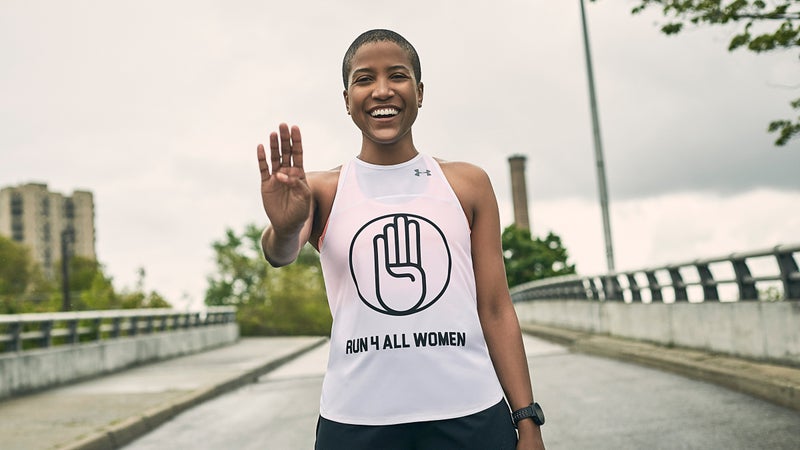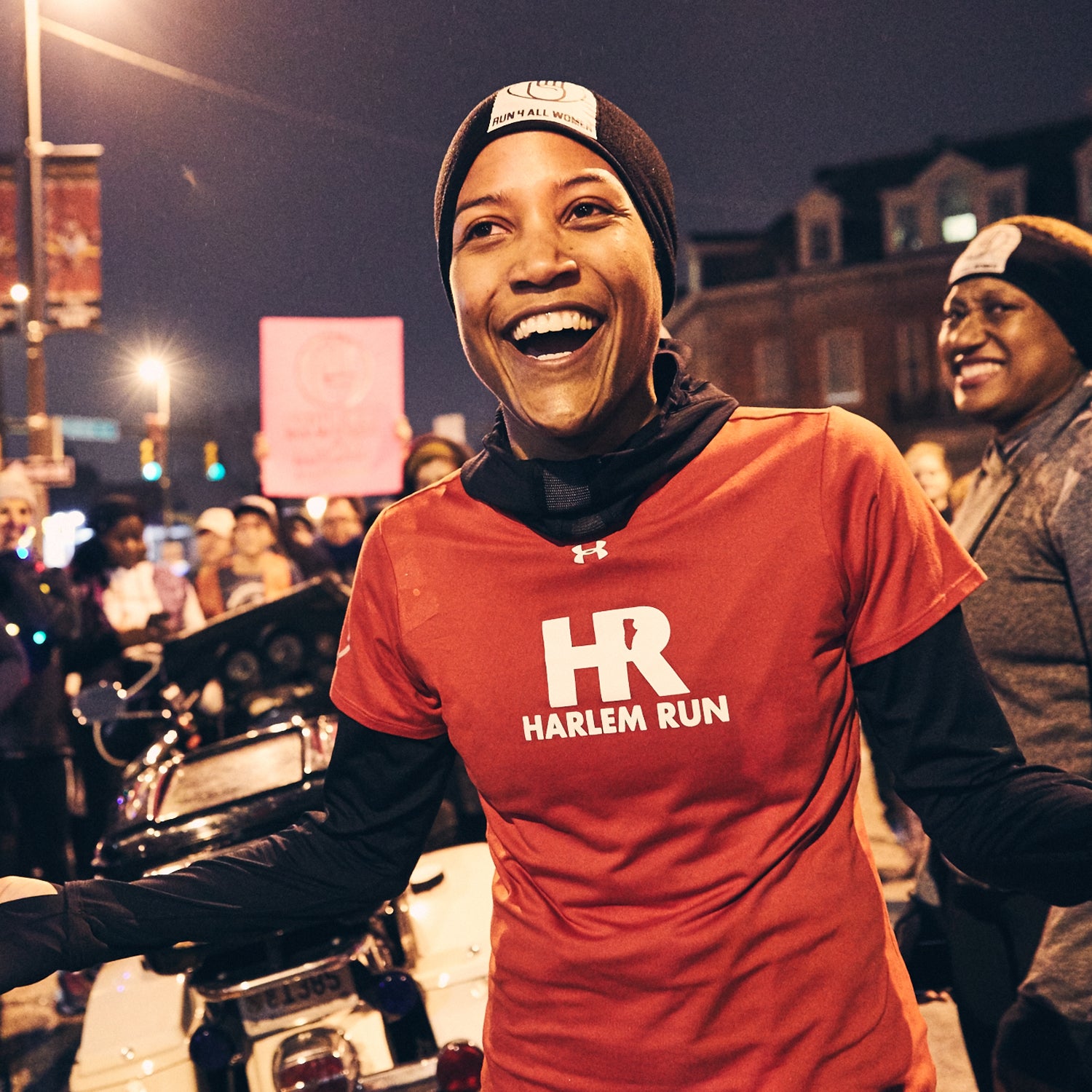On January 18, 2017, five black women in Harlem took their first steps toward D.C. Talisa Hayes, Marquita Francique, Kim Rodrigues, Alma Nolasco, and Alison Désir ran 252 miles as a relay over 60 hours, averaging ten-minute miles. They arrived the morning of the Women’s March and ascended the steps of the Capitol Building at dawn, having raised more than $100,000 for Planned Parenthood and gained . This year, Désir, the leader of that group, is organizing the to raise money for candidates who are campaigning to flip a district.
For Désir, 33, running started as a way to cope with depression in her twenties. The experience may have saved her life and prompted her to create , and has unexpectedly transformed her into an advocate for civil rights and mental health.
There were early signs that Désir was a natural leader. In elementary school in Teaneck, New Jersey, she was once assigned a project celebrating the town’s centennial. She looked at photos of people who lived there in the 1950s and ’60s, after Teaneck was named a model town by the U.S. government in 1949. “I remember thinking, ‘Wow, every single person in this photo is white,’” Désir says. “So my project was about what it really means to be a model town when people of color are excluded from representation. I was in third or fourth grade.”
Désir’s father is from Haiti and her mother from Colombia, and they ensured Alison knew where she came from at an early age. They talked about politics and anthropology as a family, bought her books about the Haitian Revolution, and scheduled reading time. Her parents nicknamed her “powdered feet,” which comes from a Haitian Creole saying to describe a super-active person—you never see her, just her footprints. Désir explains that she earned her nickname by being all over the place and never sitting down. “I think initially the nickname had kind of a self-destructive connotation.”
At 27, Désir was living in New Jersey and having a hard time. “I was going through a period of depression. I was unemployed and taking care of my father, who had Lewy body dementia,” she says. “I was really suicidal and overdosing on pills.” She often couldn’t get out of bed and would scroll through social media for hours. That’s where Désir first came across her friend’s feed. He was training for his first marathon and raising money for the Leukemia and Lymphoma Society. Désir describes him as “not your typical runner. He’s not a skinny white guy. He’s an average-size black dude.” She was intrigued by his story and the selflessness of the fundraising component. She signed up for her first race, the Rock n’ Roll Marathon in San Diego. For Désir, the marathon was a sliver of hope during a dark time. “I figured I had nothing to lose,” she says.
Soon she was training for the Rock n’ Roll Marathon. Each week, she was doing more than she had ever done before—the training plan, raising money, having a reason to leave her house all helped her start to feel better about herself and start to discover the mental impact of running.
After completing the race, in June 2012, Désir wanted to share the transformative, and in her case life-saving power of running with others. “I started getting curious about psychology, sports psychology, counseling psychology. I realized other people actually use running to help with their depression, or after family members have died, after they’ve had divorces,” Désir says. “This first marathon was what created a shift in my mind about what I was capable of and what was possible through running.”
To learn more about the link between mental health and running, Désir went back to school to pursue her second master’s degree in counseling psychology. She also started a blog called Powdered Feet. But the blog wasn’t enough—Désir craved the human connection she had while fundraising and running with others. In November 2013, she launched Powdered Feet Run Club, a running group that she hoped would serve communities of color, which eventually became .
“Nobody showed up for, like, four months,” she says. Every Monday, Désir would arrive at the designated meeting spot, and sometimes her best friend would join, but no one else. There was more at stake for Désir. At the time, there were no other running groups in the area. Désir wanted her group to cater to people of color and talk about the connection between running and mental health. She knew her group needed to exist and that she was the one to foster this community.
One day, someone did show up. Within a year, more than 100 people had joined, and over the next four years, many of them became committed enough to be captains and pacers. Harlem Run still meets twice a week for free group runs, welcoming “runners, walkers, and joggers of all sizes, ages, and abilities.”

Désir has run 22 more races since that first marathon, and she’s garnered recognition from publications like The Root, Runner’s World, and Self. She never wanted Harlem Run to be centered around her personality, though—instead, Désir aims to create spaces that genuinely reflect community. “I was really just intent on making sure that the most people could experience what running had done for me,” she says. Désir’s Harlem Run community became the foundation she would need to set out on her next conquest—the presidential election.
When Donald Trump was elected in 2016, she thought, “I could sit there and despair, posting angry rants on Facebook with all of my friends about the state of the world, or I could do something.” Then Désir had a crazy idea: She’d run from Harlem, New York, to Washington, D.C., for the Women’s March as a show of resilience. “I had this community in Harlem Run, and I knew that I could use that community to send a message and really impact change after the election.”
She called the only black female ultramarathon runner she knew at the time, , to see if her idea was even possible and if Hayes would run with her. “When she said yes, that’s when this [Run 4 All Women] really materialized,” Désir says. As an initiative of Harlem Run, they launched Run 4 All Women with a GoFundMe campaign, asking for $44,000 in honor of the 44th president, Barack Obama, with the funds going to Planned Parenthood. They blew past their original goal in four days and made $69,000 before they even started the run.
The race was Désir’s first overnight relay, and during three days and nights, she ran more than 80 miles. “You’re running mileage sometimes in the middle of the night, at 3 a.m., and then you’re jumping into a van. You can’t stretch your legs, and at times there were eight or nine of us in the van, and we were constantly being greeted by strangers on the street who were there to support us,” Désir says.
Run 4 All Women had gone viral, and in just 20 days they raised more than $100,000 for Planned Parenthood.
After the run, Désir found that she’d become something of an accidental celebrity. Run 4 All Women had gone viral, and in just 20 days they raised more than $100,000 for Planned Parenthood. Publications were reaching out for interviews, and fans were messaging constantly; Désir appeared on the Joy Reid Show, and Women’s Running named her one of . Rather than getting distracted, Désir responded to the flood of attention by setting boundaries and made space for solo runs so she could continue doing her activist work.
Désir’s presence is growing: She has more than 10,000 followers on Instagram and started her own podcast called , where she interviews people like , the first runner in a hijab featured in American magazines. In December, Désir released a about Run 4 All Women. She remains candid about her battle with depression.
Since the 2016 election, many women and men are stepping into the spotlight for the first time by running for political office, and Désir is lacing up her running shoes once again. The goal of Midterm Run is to run 2,018 miles across the country with a team and raise $3,000,000 for 11 candidates across six states. The campaign’s tagline: “They’re running for us, so we’re running for them.”
Her mother still worries, especially after the attention that Run 4 All Women stirred up, that Donald Trump will tweet at Désir one day. But what are a few detractors when you’re willing to run hundreds of miles for your beliefs? When I asked Désir what her parents thought about her grade-school presentation on representation in Teaneck, she imagined what they might have been thinking and inadvertently came up with just the right motto: “She’s going to be somebody who continues to cause trouble, but in a meaningful way.”


